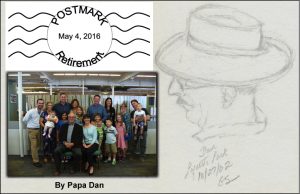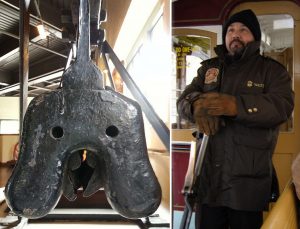Archive for Retirement Reflections
Holding On and Letting Go

“Some luck lies in not getting what you thought you wanted but getting what you have
— which, once you have it,
you may be smart enough to see
is what you would have wanted
had you known.”
— Garrison Keillor
OK, so I retired. I planned it; informed my colleagues at work of my retirement date; initiated some efforts to begin the process of replacing me; and started clearing out my office. Friends suggested I should begin to write about the experience; but, when I tried to find words to describe how I expected it would feel, no words came to mind (a relatively rare experience for me). But after a week or so, some words began to emerge.

My 31-year career at Lawrence Livermore National Laboratory can be likened to the operation of a cable car, like those running on the streets of San Francisco. (Oh, really? you may ask.) Bear with me here; let’s try this out.
Cable cars are pulled along by a 1.25-inch-diameter cable beneath the streets of San Francisco. That cable runs at a constant speed of 9.5 mph, driven by an electric motor located in a central power house. The forward movement of the car is determined by a highly skilled gripman (left), who controls the way a “grip” (far left) grabs hold of the cable. When he grips the cable tightly, the car is pulled along at the speed of the cable. When he releases his grip, the car coasts, independent of the cable, until he again tightens his grip on the constantly moving cable. The many steep hills of San Francisco require a tight grip on the cable when there is a need for the car to travel uphill. When downhill is the right trajectory, the gripman must skillfully manage the right combination of holding on and letting go to ensure a smooth ride that takes him and his passengers safely where they need to go.
Over the years, traveling through the six laboratory organizations I have worked for, there were times of intense activity (most of the time) pulled along by goals, deadlines, and budgets, and other times when the pace could be slower, allowing time to think and plan and reconsider the next steps. Those typical ‘intense’ times were analogous to periods of holding on to the grip and allowing the ‘cable’ (i.e., the mission of the laboratory) to pull us along at its own required pace. Sometimes other people controlled the “grip,” and therefore determined the pace and intensity of the work; other times I found myself, and others around me, in a position to determine the pace and allow us the luxury of coasting awhile. Frankly, the times of ‘holding on’ far exceeded the times of coasting. Such was the working life that had become familiar to me for more than three decades.
Gradually, as the little voice in the back of my head spoke up to make itself heard, I began to listen to a new idea: perhaps the time had come to let go of the grip for good and let the constantly moving cable under the street move on without me. (This, of course, also meant moving on myself, in a different direction, without them; but more on that later.)
So, it became a plan. The plan included a decision about when to let go of the cable and how to prepare those around me for that decision. The work of the organization I belonged to is important and that work will continue. There was no question that they could do it without me; but I cared enough about it, and them, to want the transition to be smooth.
Letting Go . . . of What?
At this early stage, it looks like this decision means letting go of several obvious things of varying importance:
- Time pressures: you know, the six o’clock alarm, scheduled meetings,
- Patterns of behavior: when and where to have lunch, choosing the route to drive to and from work every day, etc.
- Responsibility to others: day-to-day commitments we all make to each other to get the job done
- The ever-present, over-arching commitment to a common mission, requiring us to look ahead beyond the present task
- The “Sunday-night yuckies” – admit it, you know what that means.
After some thought, over the first full week of this experience, it seems that there are a few more substantive and enduring things I may be ‘letting go’ of. These seem to take the form of questions, rather than answers:
? Given the fact that a significant portion (though not all) of my identity has been formed by this multi-decade working experience, a question lurks: how much of my identity – my own sense of who I am – will I be ‘letting go’ of? What will remain? What new elements of my identity are yet to be formed by this new experience?
? And what about “letting go” of “them?” – those terrific people who have been such a part of my life all these years? Given the fact that I have formed wonderful working relationships and friendships over these many years, another unavoidable question hangs in the air: how many of those will I be ‘letting go’ of? Some will inevitably move on without me as they continue to grip the constantly moving underground cable. Will some of those connections remain? Part of me wants to leave them with the popular Italian song: “Non ti scordar di me.” “Don’t forget me.”
I suspect that answers to these ‘letting go’ questions may come later. But there is no doubt that letting go of my grip on that cable is not a trivial change.
How Does It Feel Today?
In the past, days off, vacations – even long ones – always had the awareness of an end-point. Always in the back of my mind, sometimes consciously, sometimes not, was the lurking notion that the “Sunday Night Yuckies” waited at the end of periods of time off from work. One of my first observations of the past week is the absence of that feeling. Today is Monday the second of May – not the usual kind of Monday – and there is no feeling of any forced pattern to the days to come. Ahead, we have plans to spend some days in Lake Tahoe, some in San Diego, others in Ashland still others in Yosemite in the fall. I am suddenly aware that each one carries the new future that, when we come home from travel, near or far, I will not be going back to work on Monday.
What About Tomorrow?
There is much I don’t know about the future (OK, it’s everything that I don’t know about the future.) So I will rely on another of my favorite literary sources for understanding on that topic: Star Trek VI: The Undiscovered Country (1991). That movie was full of references to Shakespeare, but the title, set against this particular story of hope for the future, has a dual source of wisdom. It suggests that “the undiscovered country” does not have to be death (as it is in the source: Hamlet’s “To Be Or Not To Be” speech). By implication, it also doesn’t have to mean the imminent arrival of decline. For those of us willing to look forward with optimism, the ‘undiscovered country’ is the future. Captain Kirk’s final instruction to his crew is to set a course for the “Second star to the right and straight on ‘till morning.” That, of course, recalls Peter Pan’s directions to Neverland, where creatures never grow up or, at least, cease to age. In any case, this appeal to “the undiscovered country” is my expression of optimism – to reject the appearance of an ending — that the future, though unknown, is not a place to be feared, but something to anticipate with optimism.
Kirk: I think it’s about time we got underway ourselves. [sits on captain’s chair]
Commander Uhura: Captain, I have orders from Starfleet Command. We’re to put back to Spacedock immediately … to be decommissioned. [long pause as Kirk considers the order]
Spock: If I were human, I believe my response would be “go to Hell.” [Kirk looks at Spock. Spock repeats to Kirk] If I were human.
Chekov: Course heading, Captain?
Kirk: Second star to the right and straight on till morning.
Download a PDF of this post: ConVivio_Retirement_pt1
![]()